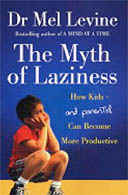
The Myth of Laziness
by Mel Levine
Simon and Schuster, £10.99, pp288
Self-help books induce a terrible feeling of lassitude. It seems such an effort, somehow, all that improving. And books that propose to help my children have an even more deadening effect, making me long to run away with them to a beach, somewhere we might live off fish and coconuts. I am exhausted by the mere thought of exerting myself to equip my children for late capitalism, so they can shine at school, have well-paid jobs and afford to take the odd holiday to a resort somewhere they serve fish and coconuts.
So I approached Dr Mel Levine's book with considerable trepidation. Not only does he begin with strictures about how many people are suffering from 'output failure' (which seems to assume, rather rashly, that we're all agreed that the purpose of life is to Succeed) but I'm not allowed even to feel my usual defensive laziness about it. There is, according to Levine, no such thing as laziness.
What we commonly call laziness, he explains, is precisely this output failure, a condition that derives (I simplify, but this is essentially his argument) from faulty brain wiring. We are all productive machines, really, and all we, or our children, need is a kind of brain electrician - bring on Dr Levine - to put us right.
In fact, Levine's title does his book a disservice, because he isn't really writing about lazy children at all, but about children with difficulties, and quite specific difficulties at that. I suppose he thought he wouldn't sell as many copies if he'd called it 'How to Help Children Who Are Bright But Can't Write As Well as They Can Think'.
That, though, is what the book is about, and rather good it is, too. Once Levine has got through the first few pages, in which he struggles to justify the title and convince us that children who experience difficulty at school are commonly written off as lazy, which, in reality, would be considered rather politically incorrect these days, he seems much happier. Now he can discuss the frustration of not being able to get perfectly good thoughts down on paper, and what a drag this is given the way children are examined and graded.
A thoughtful and vivid writer, he avoids glib, catch-all diagnoses (dyslexia, dyspraxia, ADHD) in favour of subtle excavation of the numerous, subtle and often interlocking mental peculiarities that tend to make writing difficult - problems with organisation, muscle control, stamina, memory - 'a mixed bag of developmental dysfunctions and strengths'.
It would be comforting if he also had some simple solutions, but he doesn't. He can't offer much more than improvement at the margins: memory-strengthening exercises for some, muscle-training for others, squeezy balls for the fidgets. He does, though, make the important, if obvious, point that such children often find adulthood easier, because they can find work that plays to their strengths, and it is essential not to disillusion or exclude them in a way that will undermine their confidence.
Despite an apparent conviction that brains seem genetically programmed to work differently in different people, Levine does have some stern words about parenting. He thoroughly disapproves of the home-as-multimedia-centre and paints an ideal image of a family all sitting round the table after dinner doing homework, and adult varieties of it. He approvingly quotes a father who asks his children every night: 'And what interesting questions did you ask today?'
There is, of course, a constant tension between opening up the world to one's children and pushing them into it, but here, I am afraid, he lost me to something that looked suspiciously like laziness. Anything that smacks of Children as Productivity Project, I'm afraid, still makes me want to sink on to the sofa with a box of truffles and some nice daytime telly.

